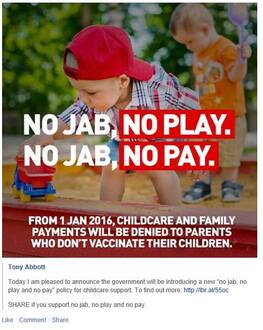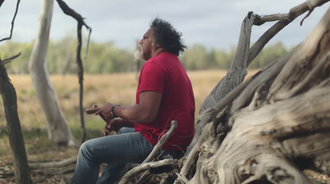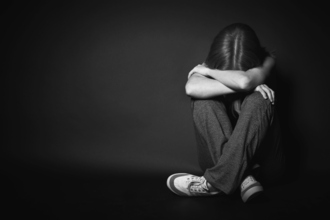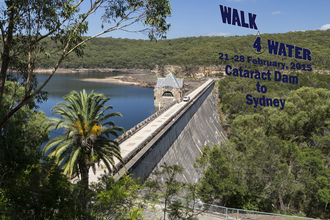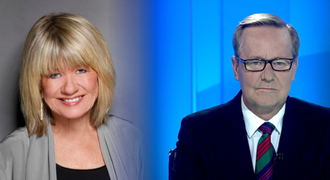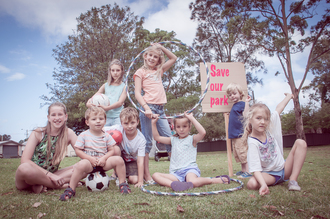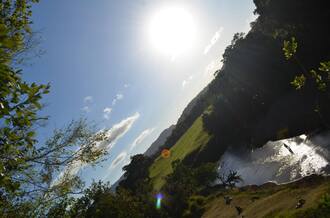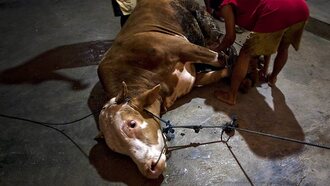-
Fight for the ForestThe Wet Tropics has been ranked the second most irreplaceable World Heritage Area in the world by a team of international scientists. Despite its significance, the International Union for the Conservation of Nature (IUCN) has classified the Wet Tropics as of ‘significant concern’ due to the threats posed by invasive plants, animals and diseases and climate change. The Wet Tropics World Heritage Area as high visitor rates and provides economic stimulus through tourism in Far North Queensland, an industry that much of the regions economy depends on. Without the work of the Wet Tropics Management Authority, there will be no independent body that can consider the diversity of the people and places that exist in the World Heritage area and how to properly Manage them213 of 300 SignaturesCreated by Lucy Graham
-
No jab no play ... no jab no payPlease sign this petition if you believe parents have a right to choose what's best for their children and don't have to pay penalties for a well-informed decision. After all by trying to take away family and childcare payments from low income families who conscientiously choose to selectively vaccinate or not vaccinate, the Australian government is putting parents in the impossible position of having to choose between feeding and housing their families and vaccinating their children against their will, THIS IS NOT LEGAL CONSENT, IT IS UNCONSTITUTIONAL AND IT IS BLACKMAIL!6,136 of 7,000 SignaturesCreated by Britta Gisder
-
Stop Adani destroying our land and our cultureWe are gravely concerned about the push by Adani and the Queensland Government to open up the Carmichael Mine on our traditional lands. Our traditional lands are an interconnected and living whole; a vital cultural landscape. It is central to us as a People, and to the maintenance of our identity, laws and consequent rights. If the Carmichael mine were to proceed it would tear the heart out of the land. The scale of this mine means it would have devastating impacts on our native title, ancestral lands and waters, our totemic plants and animals, and our environmental and cultural heritage. It would pollute and drain billions of litres of groundwater, and obliterate important springs systems. It would potentially wipe out threatened and endangered species. It would literally leave a huge black hole, monumental in proportions, where there were once our homelands. These effects are irreversible. Our land will be “disappeared”. Nor would the direct impacts be limited to our lands – they would have cascading effects on the neighbouring lands and waters of other Traditional Owners and other landholders in the region. And the mine would cause damage to climate, unleashing a mass of carbon into the atmosphere and propelling dangerous global warming. We could not in all conscience consent to such wholesale destruction. Nor could we allow such a project to contribute to the dire unfolding effects of climate change that pose such great risks to all peoples. We know that many other people who care deeply about conserving natural places, vital water resources, the great fauna and flora of central Queensland, and a health planet share our concerns about this mine. When we say No, we mean No. https://youtu.be/ZB2JC6yKy_E135,335 of 200,000 SignaturesCreated by Adrian Burragubba
-
End Domestic and Family ViolenceWe have probably all heard the statistic: one Australian woman dies at the hands of a partner or ex-partner every week. But so far in 2015, women are being murdered at double that rate, and in Queensland alone in 2013-14 there were more than 66,000 reported incidents of domestic and family violence. It's time to act. Urgent steps must be taken by our leaders and policy makers now, to ensure this shameful epidemic no longer ruins the lives of generations of families. Rest assured, someone you know has been affected by family violence. Australian of the Year Rosie Batty, whose own son, Luke, was murdered last year by his father, has campaigned fiercely for short-term and long-term change. In the long term, let's change the entrenched attitudes and gender inequalities that help create the environment for domestic and family violence in the first place (such as through respectful relationships education in schools); but in the short term, let's improve the support services and responses from organisations such as the police and courts, so victims know they are not alone. Rosie is supporting our campaign, and we are supporting her. Get on board and help be a force for change.2,503 of 3,000 SignaturesCreated by Christina Ongley
-
Improve Telstra coverage at Wentworth PointWe pay big bucks to Telstra, as the premium telco in Australia. You promise great coverage to 98% of Australia. It is incomprehensible that Wentworth Point, so close to the geographical centre of Sydney should fall into the 2% of poor / no coverage. Take responsibility and fix the problem Telstra!356 of 400 SignaturesCreated by Bronwyn Evans
-
Remove the Solar DC Isolator from the Roof!In mid-2012, Australia and New Zealand together issued a new standard for the installation of solar arrays. This standard mandated the use of a specific piece of equipment called the "rooftop DC isolator" in Australia, and by some interpretations also in New Zealand. They did this despite evidence showing that the practice is unsafe. A study from an international testing laboratory found that DC isolators are not safe in a firefighting situation, as they can’t withstand the high-pressure water used to extinguish a fire. The California State Office of the Fire Marshall frowns upon their use, because they give a false sense of security. And Europe, the most mature solar market, opted never to adopt them, also for safety reasons. More than 70 fires in Australia have been caused by this isolator since 2012 -- that is, since it became mandatory! To put this into perspective, there were only 3 fires related to PV systems in Australia prior to the mandatory requirement to install a rooftop DC isolator. The Australian government has responded with product recalls on DC isolators, at least 5 so far, showing this crisis isn’t just limited to a single manufacturer, but to the device itself. There is no evidence to suggest the device improves the safety of a PV system: all it does is increase costs and the risk to homeowners trying to do the right thing. And that's not to mention the catch-22 for PV installers who are both legally bound to comply and obliged to keep their clients safe. Master Electricians Australia chief executive Malcolm Richards in an interview with the ABC late last year said that he says he knows of about 40 to 50 fires that have been started by the faulty isolators. "We're warning home owners to carefully check the brand of isolator that is connected to your solar panels," he said. "If it carries one of these two (recalled) brands ... undertake the isolation procedure until your electrician can come around and fix that up to eliminate or replace it."1,624 of 2,000 SignaturesCreated by Lucas Sadler

-
Stop Mining in Our Water CatchmentOur Sydney water supply is currently under threat from coal mining that has been allowed under successive state governments in the southern coal fields beneath the Metropolitan water catchments' Special Areas. It is estimated that the Metropolitan catchment (Cataract, Cordeaux, Avon, Nepean and Woronora dam catchments) is losing 3 billion litres of water per year due to mining. If anyone enters these areas without permission they are liable to a $40,000 fine. Yet the Department of Planning has recommended the expansion of existing coal mines to undertake intensive longwall mining under the Cataract Dam catchment. The Metropolitan catchment contributes to 20% of Sydney's drinking water and is the sole supply of water for the Macarthur and Illawarra regions (over half a million people). Mining operations undermining the catchment of Woronora Dam have demonstrated how devastating this practice is with the sandstone creek bed of Waratah Rivulet irreversibly cracked and drained. The state government have also allowed exploratory Coal Seam Gas (CSG) wells in the Special Areas of the Warragamba and Metropolitan water catchments. There are also 95 producing CSG wells located in the Camden Gas Project with some within 200m of residences and on the flood plains of the Nepean River. The Nepean River is a source of agricultural water for the Hawkesbury/Nepean region and drinking water for North Richmond community. It is reckless to allow mining in these areas because of the risk of contamination of the surface water by fracking fluids or produced water from the coal seams. The current federal coalition government is offering incentives for state governments to sell and privatise assets. Sydney Water is a likely target as has been done in South Australia and Victoria. Experience shows privatisation leads to an increase in prices and reduction in maintenance. This is despite former Premier Barry O'Farrell's promise before the state election that a coalition government would not allow ("No ifs, No buts") mining in our water catchments. In an effort to draw these issues to the attention of the public and the candidates in the lead up to the state election on 28 March, 2015 a group of concerned citizens are embarking on a Walk for Water. This is a 160km walk from Cataract Dam to Hyde Park, Sydney between the 21-28 February. You can join us for part of the journey to show your concern for our most precious resource, water. Which is becoming even more precious in an ever expanding Sydney, in a climate that NASA and CSIRO acknowledge is trending hotter and experiencing longer, more severe drought events. You can find out more on Walk for Water at www.walk4water.net567 of 600 SignaturesCreated by Michael Streatfeild
-
Preserve its Integrity! Don’t Increase Ads on SBSThe further commercialisation of SBS will take it to the brink of a shadow of its former self and amounts to a strangling of the world’s first multicultural broadcaster. Australia's public broadcasters should be adequately funded from the public purse however despite making an election promise not to cut SBS or the ABC[1], the Abbott government has slashed funding twice to both since being elected, and now the government proposes to increase advertising on SBS radio and TV by ad-averaging[2][3]. The Lewis efficiency review into SBS was supposed to focus on back office efficiencies. More ads is hardly a back office change. It’s a full frontal in-your-face change, forever. Increased advertising will lead to SBS being less efficient in its primary function – Charter compliance – not more efficient. As a result of SBS advertising increases in recent years (due to in‑program advertising), compliance with the Charter decreased significantly[4]. http://bit.ly/1Ar1Dbt The Lewis review acknowledged there will be risks to Charter related content and LOTE programming as a consequence of further increases in advertising[5]. Reputable evidence worldwide and locally shows populist programming dominate and non-adherence to Charter is proportional to the placement of advertising[6][7]. If the review had been serious about SBS becoming more efficient in Charter compliance, this opportunity would have been used to remove in‑program commercial breaks, not ramp them up. When the Fraser Coalition government established SBS television in 1980, it was on the back of two multilingual radio stations formed under the Whitlam Labor government and bi‑partisan support for multiculturalism. SBS played and still plays an important role in social cohesion and inclusion in Australia however this drastic commercialisation threatens its special purpose. SBS is already conflicted with the current placement of commercial breaks inside programs, and an increase in advertising will only further make the advertiser the client, instead of the viewer. Until 2007, SBS did not have ads within programs but side-stepping the Parliament, community debate and the courts, SBS exploited a loophole in the law to do so. Any further increase in advertising will critically jeopardise the integrity and mandate of SBS, and undermine its ability to espouse multiculturalism, social cohesion and inclusion. Audiences love SBS and would love it a whole lot more without more commercial breaks continually disrupting programs. It is not fair play to increase advertising, take money from and reduce the budget set aside for SBS. Financially, SBS is a very efficient broadcaster operating on a budget that is far less than any other network. “This is no way to treat SBS which has made a remarkable contribution to the success of Australia as an inclusive and cohesive multi-culture. And you’d think in terms of counter terrorism the role of SBS in inclusion and cohesion would be more important now than ever before. What we’ve got here is an ideological aversion to public broadcasting”[8]. This changes the dynamic of any government commitment to multiculturalism and the role of SBS as a valuable link in engaging culturally and linguistically diverse people in a socially cohesive society, furthermore if the proposal becomes law, SBS will be required to hand over the advertising revenue from increased ads to government. Nothing in the Minister's statement[9] requires SBS part with any ad revenue if the proposal to increase advertising fails to become law and that consistently remains the official line of government and SBS[10][11]. If it does become law, the government will take $28.5m of SBS's ad revenue – the amount that SBS predict they will earn from more ads. If the proposal fails to become law, SBS will keep all of its ad revenue – the status quo. Money earned by the new regime for ads is no more than money removed from the budget. It’s a cut. Advertising revenue has never been additional income for SBS. The more successful SBS is at generating revenue from advertising, the further it departs from its Charter and the greater it is then underfunded by government. Regardless of whose idea it was or when[12], increasing ads is another step in the awful commercialisation and trashing of SBS and has not been welcomed by anyone. SBS audiences don’t want it, SBS staff don't want it, the individual communities SBS works in partnership with certainly don’t want it, community and commercial[13] broadcasters don’t want it. No one wants it. It is bad policy and not wanted under any circumstances. Margaret Pomeranz AM & Quentin Dempster AM http://bit.ly/1IDmXwq Sponsored by Save Our SBS and GetUp! http://bit.ly/1DvXB2D http://bit.ly/1yyQnMi References: http://bit.ly/14xjov962,169 of 75,000 SignaturesCreated by Save Our SBS .
-
Help Protect Local Parks For Future GenerationsWhen my husband and I first moved into the area almost two years ago, as a mum and dad of two small children aged two and four, it was lovely to know that we would live very close to a little park called Regent Street Park. When we moved we did not know our neighbours, or have any support network in the nearby area. However soon after moving we met our first neighbours who came to say hello and welcome us to the area. They had spotted us running about playing ball in the park with our kids. Since then we have been welcomed by a wonderful little community - and at the heart of this community is our local park. Our local park has become the place we play outdoors with our kids, have a picnic lunch outside or go looking for bugs and birds. Others use the park for exercise, a dad throwing a ball in the park each week with his teenage boy, a social game of footy, a place to practice your golf swing, others meet here with their dogs. Each year the park hosts our Christmas Party. Santa arrives with a sack of presents for the neighbourhood kids. The park has also seen its fair share of birthday cake. Some of the neighbourhood kids now are getting a little older and they are allowed to go to the park themselves (mums and dads can sneakily peer over the fence) - a big adventure that would not be afforded to these kids had they only the larger park some distance away and across a main road. The older generation across the street watch them and muse to us parents about the changing generations they have watched come and go from the park over the years, and its makes me sad to think this part of the community could be lost for future generations however small and insignificant to others it may seem. Now most Friday neighbors meet in the park to talk about our week - an opportunity to leave our houses and small backyards. Two weeks ago thirtyish of us sat in the park and ordered pizza – one of the neighbourhood Mums with four kids had had a busy week whilst her husband was away working, for her the evening was an opportunity for the sanctity of friendship and a listening ear. Three of the bunch have recently emigrated from England and China. For them this time, this space, really does matter. I know our little park is just that - a little local park. It does represent the centre of our community, something which is increasingly important in urban environments, something I want my children and other children to experience. This small green space, this park, is important to our community. There are five other areas of land in the Newcastle locality, which in most cases are being used as parks by local residents, which are up for reclassification and potential future sale and development. Please encourage Newcastle city councillors to recognise the importance of these small parks, and sign the petition to save them.960 of 1,000 SignaturesCreated by Kristie Hitchcock
-
Save Mimburi from being sold by the Queensland GovernmentMimburi models and teaches Indigenous cultural understandings. It is a land that builds partnerships between humans and the natural world through traditional art and cultural practices. Mimburi is an Aboriginal learning and healing place; a place whose flow reflects the confluence of the rivers, traditional Indigenous crafts and agricultural practices, and cross-cultural exchange.3,278 of 4,000 SignaturesCreated by Marc Bytheway

-
BAN "LIVE EXPORT"Because producers, politicians and the community are being deceived by an industry that puts profits over ethics and welfare. After nearly 20 years in Egypt and 18 years in Indonesia, investigations have repeatedly revealed that all the live export industry has done is endorse the use of brutal slaughter devices, condone un-stunned slaughter and ignore the cruelty that inevitably results.8,801 of 9,000 SignaturesCreated by Puja Berry
-
Save Our Broadwater - Stop ASF before it is too late!The Broadwater is a social, environmental and economic asset to our city which locals and tourists alike use and love, and we do not want its natural beauty and character destroyed by high density urban development or a ship terminal. The development proposed will entail millions of m3 of dredging which will destroy the habitat for dugongs, dolphins. migratory birds and over 450 species of marine life in the Gold Coast Seaway. Proposals to construct a huge development for 15,000 people mid Broadwater will create a visual abomination and severely impact upon traffic, infrastructure and population in adjacent suburbs like Southport, Labrador and Runaway Bay, leading to the M1. Finally, the community loves and uses its magnificent Broadwater and islands as its boating, swimming, sailing, fishing and recreational heart. This development will destroy this freedom and privilege, and change the beautiful face of our city forever. ASF can construct its development on private land it purchases like every other developer who invests in our city. We do not need to sell off precious public open space and waterways to attract investment. Further, the Broadwater as a shallow estuary of great environmental significance, is completely inappropriate for a ship terminal and consideration should be given both to extensive scientific research into offshore options and to optimising passenger shore visits from terminals constructed in Brisbane.12,212 of 15,000 SignaturesCreated by Save Our Broadwater Inc


